Facebook is still spreading anti-vaccination ads, recommending groups after promised crackdown
The world’s largest social network has been branded “irresponsible and dangerous” for still hosting vaccine misinformation, taking ads and supporting fringe groups.
Exclusive: Facebook has been branded “irresponsible and dangerous” for continuing to support anti-vaccination groups in Australia, despite promising a clampdown.
News Corp can reveal the social network is still selling goods, recruiting members, and hosting fundraisers and advertisements for the fringe anti-vaccination organisations.
The revelations come months after Facebook promised a blitz on “vaccine hoaxes” on its platform and just one week after complaints emerged about measles-laced lollipops being peddled in Facebook posts.
Medical experts argue the company needs to take urgent action to remove false and potentially harmful information from its website to protect children, while social media analysts say the issue points to a deeper inability to stop the spread of misleading information.
A News Corp investigation found Facebook was actively hosting anti-vaccination ads on its platform and, even after announcing a crackdown on anti-vax content in March, had spread paid advertisements for an anti-vaccine documentary series and guides to raising “vaccine-free children”.
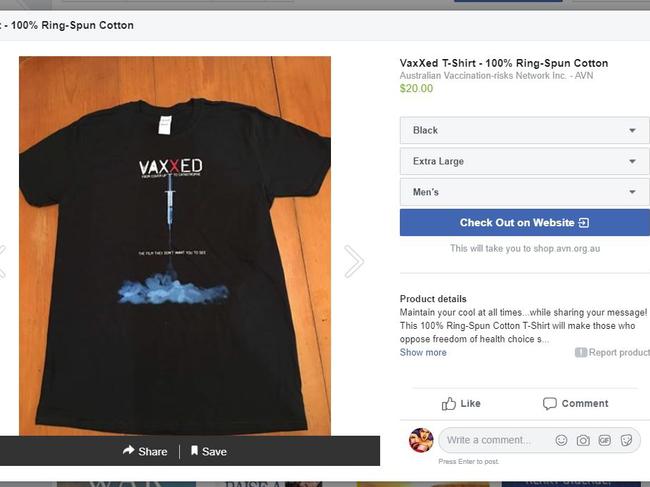
One prominent Australian anti-vax group with more than 11,000 ‘likes’ was also able to sell tickets to a controversial anti-vaccination film, as well as literature and merchandise on its Facebook page, including a book claiming to tell “how science lost its soul in autism,” and T-shirts urging anti-vaxxers to “be brave”.
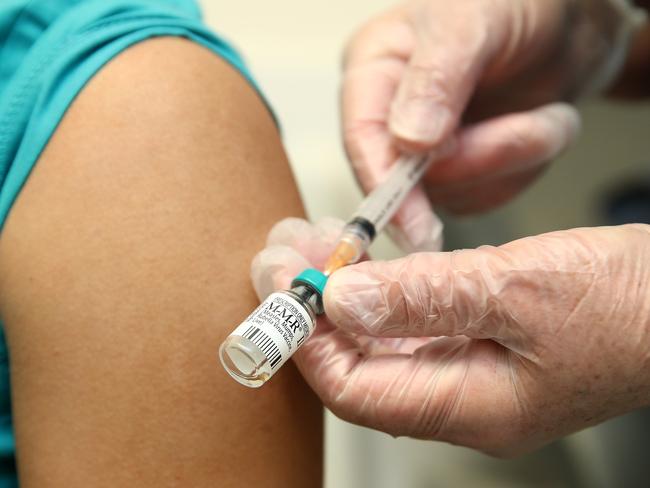
Facebook also actively suggested anti-vaccine groups for its users to join, even though the company pledged to “exclude” these groups from recommendations this year.
Southern Cross University lecturer Dr James Donnelly said the examples proved the social network needed to “vet their content” more carefully to prevent the spread of misinformation that could harm Australian children.
“It’s just irresponsible and dangerous,” Dr Donnelly said.
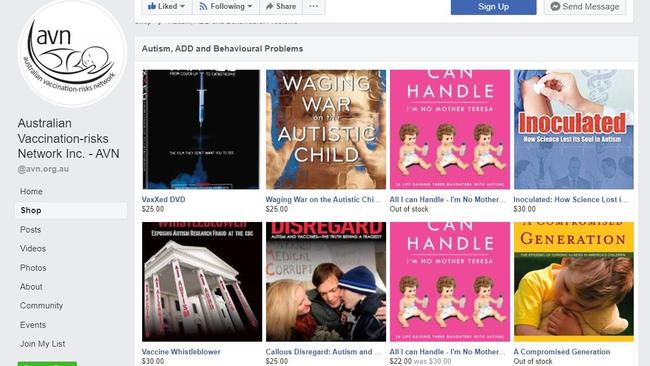
“We continue to do research on what the reality is around vaccinations. Unfortunately, there are people out there who are unscrupulous and are willing to share messages that are just ignorant, and that ignorance is fuelling fear.
“It only takes a small group to keep their kids unvaccinated and those kids will get really unwell and in some cases could become disabled.”
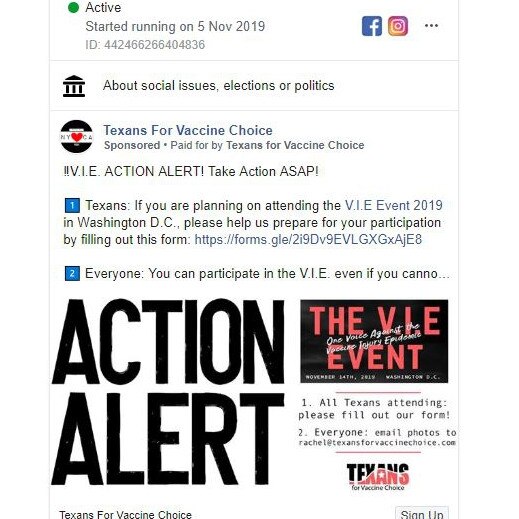
Australian vaccination rates have increased since the introduction of ‘No Jab, No Pay’ laws in 2016 but fall just short of the national target of 95 per cent.
Some vaccine-preventable diseases are still prevalent in Australia as a result, with 238 cases of measles reported by the end of October, as well as 9566 cases of whooping cough.

The World Health Organisation also reported as 300 per cent rise in measles cases in the first three months of the year.
The outbreaks led to 60 public health leaders to sign and issue a document known as the Salzburg Statement in July, urging social media companies to stop vaccine misinformation that “threatens the personal and community protection these vaccines offer”.
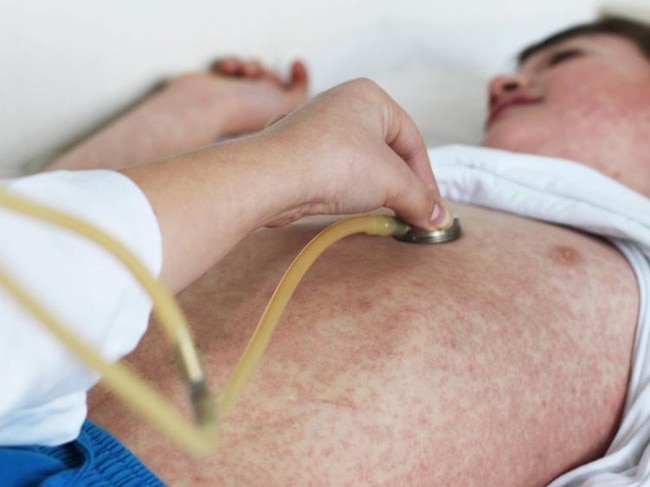
“While the overwhelming majority of parents and physicians continue to support and use childhood vaccines each year,” they said, “the sustained, global campaign of vaccine misinformation, driven substantially through the social media, has shaken the confidence of increasingly large numbers of parents concerned about their children’s wellbeing.”
Facebook global policy management vice-president Monika Bickert announced in March that the company was looking into ways to limit the spread of vaccination hoaxes on its network but stopped short of removing anti-vax groups or misleading content.
MORE NEWS
How to start one of Australia’s most popular trades
Six weeks to Christmas: How to avoid spending too much
Americans ‘shocked’ by Aussie press freedom limits
Ms Bickert said Facebook would reduce the prominence of anti-vaccine groups, could remove their fundraising tools, and would take down “ads that include misinformation about vaccinations”.
But when asked why ads about “vaccine alternatives,” fake autism “cures,” and anti-vaccination rallies were still being run on Facebook, a spokesperson said it could not “catch every ad” with automated and human moderators and would instead act on misleading content “subsequently reported to us”.
“We do not want ads that include widely debunked misinformation or make misleading and unsubstantiated claims on our platform,” the spokesperson said. “When we find them, we will reject them.”
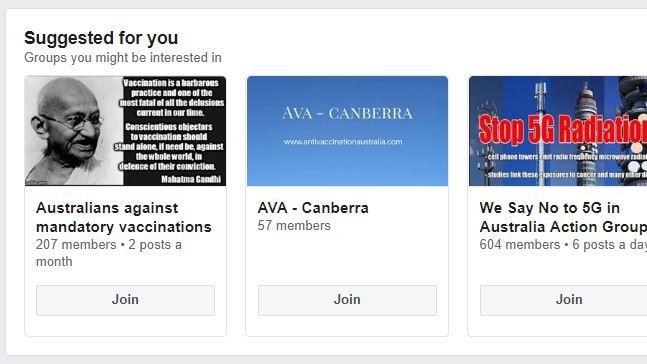
Facebook has also added factboxes with links to the World Health Organisation in many anti-vax groups, even though it still recommends those groups to its users.
Swinburne University social media major director Belinda Barnet said Facebook’s problem with misinformation extended beyond vaccine hoaxes, as it had recently been caught hosting deliberately misleading political ads.
Dr Barnet said the company needed to significantly improve moderation on its network and to take greater control over what advertisements it pushed to large, highly targeted audiences.
“They should stand up and take responsibility for the content they host on their platform,” she said.
“(Founder Mark) Zuckerberg seems to want to bring the conversation back to free speech all the time but there are thousands of media outlets that believe in free speech but still check the facts.”
Originally published as Facebook is still spreading anti-vaccination ads, recommending groups after promised crackdown
